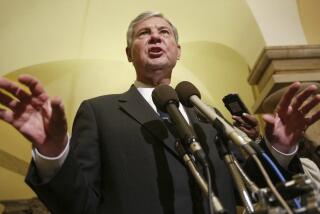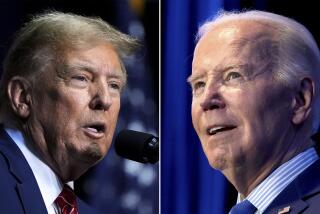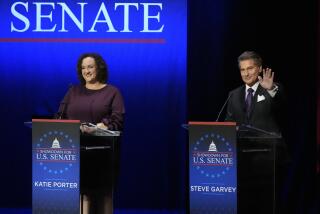1st GOP Test of ’96 Strength Is a Gramm Slam
- Share via
BATON ROUGE, La. — It was virtually a private party Saturday for Sen. Phil Gramm of Texas as Louisiana Republicans gave him a resounding victory here in the first test of strength between the likely contenders for the 1996 GOP presidential nomination.
Gramm wooed the delegates to the state Republican convention with military efficiency, filled the hall with newly minted “Gramm” placards, delivered a rousing speech Saturday morning and was rewarded with a head-turning 72% of the 1,248 votes cast.
“Winning is a habit and losing is a habit,” Gramm said, “and I want to get in the habit” of winning.
Leaders in both parties have long considered presidential straw polls something between an amusement and a nuisance, and few invest much political significance in the results of voting this long before the actual delegate selection process begins with the Iowa caucus 13 months from now. The vote Saturday was only an expression of preference; no delegates were at stake.
But the results symbolized the intensely methodical approach Gramm has taken to the early maneuvering. He is expected to be the first to announce his candidacy formally in late February.
The results “say . . . Phil Gramm is forging ahead, and he’s . . . giving us the pace of this campaign,” said Angela (Bay) Buchanan, an adviser to her brother, 1992 presidential candidate Patrick J. Buchanan. “Other candidates are going to have to decide very quickly whether to get in because you can’t have Gramm moving ahead in state after state and then expect to get into the race eight months from now and have success.”
*
Patrick Buchanan, who drew over one-fourth of the Louisiana vote in his 1992 primary challenge to President George Bush, finished a distant second Saturday, with 12%. Former Tennessee Gov. Lamar Alexander followed with 5%.
Three other big-name Republicans who did not attend drew only minimal support: 3% for former Housing and Urban Development Secretary Jack Kemp, 2% for Senate Majority Leader Bob Dole and 1% for former Vice President Dan Quayle.
The convention had all the trappings of the real thing. Banners and buttons that celebrated the potential Republican candidates and ridiculed President Clinton. “Dr. Jack Kevorkian for White House Physician,” read one.
But even most delegates considered January, 1995, more than a bit premature to begin focusing on their choice for President. “That’s like figuring out who I am going to vote for in 2004,” said Jim Norris, a banker from Monroe.
Norris said he voted for Gramm in the straw poll but added: “That has nothing to do with anything. Who knows how it is going to shake out?”
Indeed, the GOP presidential field remains very much in flux.
Alexander says he plans to announce soon after Gramm. But former Defense Secretary Dick Cheney announced last week that he would not run. Though nearing announcement of an exploratory committee, Dole hasn’t sent a sure signal that he will run.
At the same time there is increasing skepticism about Kemp’s intentions and Quayle’s health. Quayle had his appendix and a benign tumor removed last week. Buttons on sale here hinted at other potential entrants: Massachusetts Gov. William F. Weld, California Gov. Pete Wilson, even House Speaker Newt Gingrich.
Folksy and staunchly conservative, Gramm has a natural appeal for many Southern Republicans. But his strong showing Saturday probably said more about his approach than his political strength.
Every four years, at least one candidate pursues the nomination simply by working harder than anyone else. This year Gramm and Alexander have been vying for that title, but Gramm now appears to have taken the edge. “There’s only one speed on my motor, and that’s all-out,” he said Saturday.
*
In Louisiana, Gramm’s efforts dwarfed those of his competitors--some of whom claimed they were unaware of the straw poll until the past few weeks. Two Gramm aides spent several weeks in Louisiana organizing his support. Gramm devoted Friday to courting delegates at small meetings and a large reception.
In the weeks before the convention, Gramm called about 100 delegates, one aide estimated--though other candidates placed the figure even higher. Gramm’s forces mailed the delegates an endorsement letter from two Louisiana congressmen, Republicans Jim McCrery and Richard H. Baker, as well as a blizzard of Christmas cards.
All the personal attention left the desired impression. Ben Marshall, an official in Ouachita Parish, said he had been inclined to back Kemp but had committed to Gramm in 1996 after meeting him this weekend.
“To support someone, you have to be asked,” Marshall said. “I just feel like Phil Gramm has a lot more on the ball.”
The Louisiana event was the first of many scheduled during the next several weeks in other states that will select delegates near the front of next year’s compressed primary calendar.
Next on the list is Arizona, where Gramm has also attracted broad support from local Republican officials. Arizona holds a straw poll on Jan. 28.
Beyond allowing candidates to recruit activists who can help organize broader support next year, these events also are akin to out-of-town openings for Broadway shows. They permit the candidates to sharpen their message before the bright lights of national attention fully lock on the race.
For his part, Gramm on Saturday offered the rhetorical equivalent of three yards and a cloud of dust: a straightforward recitation of conservative verities on defense, welfare, crime and social spending, spiked with exuberant denunciations of the President.
“We did only half the job in 1994,” he told the convention crowd. “In 1994, we rejected Clinton’s Congress, we rejected Clinton’s programs. But in 1996 we’re going to reject Bill Clinton.”
Buchanan delivered the mix of cultural conservatism and economic nationalism that will be the centerpiece of his campaign, if he runs. He attracted loud applause for a defense of public display of the Confederate flag and for an attack on the federal judiciary--including a call for term limits on federal district judges--and a constitutional amendment to authorize national recall elections for Supreme Court justices.
*
Alexander recounted what has already begun to be his signature proposal: Cut Congress’ pay in half and send them back to their communities for half the year to work at other jobs. But he also criticized racial preferences in hiring and the distribution of academic scholarships, and criticized the “trash” of the popular culture.
Alan Keyes, a State Department official in the Ronald Reagan Administration who bills himself as the first African American to test the waters for the GOP nomination, drew a surprisingly strong response with an animated address centered on opposition to abortion. He attracted 3% of the vote.
(BEGIN TEXT OF INFOBOX / INFOGRAPHIC)
Louisiana Straw Poll
Results from the 1996 presidential straw poll at the Louisiana state Republican convention. Only 1,248 of the 1,569 delegates voted.
Sen. Phil Gramm: 902 votes, 72% Patrick J. Buchanan: 150, 12% Lamar Alexander; 58, 5% Jack Kemp: 36, 3% Alan Keyes: 36, 3% Sen. Bob Dole: 28, 2% Dan Quayle: 17, 1% Gov. William F. Weld: 8 Dick Cheney: 6 Gov. Pete Wilson: 4 Rep. Robert K. Dornan: 2 Sen. Arlen Specter: 0 Write-in Charles Collins: 1
Source: Associated Press
More to Read
Get the L.A. Times Politics newsletter
Deeply reported insights into legislation, politics and policy from Sacramento, Washington and beyond. In your inbox twice per week.
You may occasionally receive promotional content from the Los Angeles Times.










